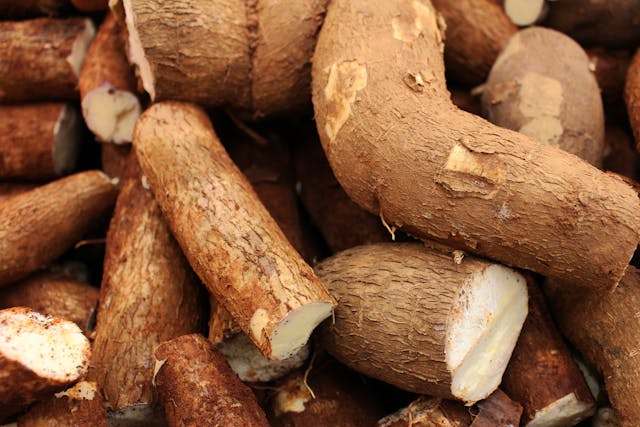
Benefits of Cassava
Cassava, also known as manioc or yuca, is a starchy root vegetable popular in tropical regions worldwide.
It’s a dietary staple in many countries, especially in Africa, Asia, and Latin America. Known for its versatility in cooking, cassava can be boiled, fried, or even ground into flour.
But beyond its versatility, cassava offers numerous health benefits that make it a valuable addition to any diet. Here’s a look at some of the most impressive benefits of cassava and how it can support your health.
Rich in Nutrients and Calories
Cassava is a calorie-dense food, making it a great energy source, particularly for those who have high energy needs.
One cup of cassava provides about 330 calories, making it a valuable food for people in developing regions or anyone looking to add more calories and carbs to their diet.
Cassava is also rich in essential vitamins and minerals:
- Vitamin C: Supports immune health, collagen formation, and acts as an antioxidant.
- B Vitamins: Essential for energy metabolism and overall cellular function.
- Potassium: Helps regulate blood pressure and is crucial for muscle function.
Gluten-Free and Ideal for People with Gluten Sensitivities
Cassava is naturally gluten-free, which makes it an excellent substitute for those with celiac disease or gluten sensitivities.
Cassava flour, made from the dried root, can be used as a substitute for wheat flour in baking. Its neutral taste and similar texture to wheat flour make it a versatile option in gluten-free cooking and baking.
Whether it’s used in bread, tortillas, or desserts, cassava flour can add variety to a gluten-free diet.
Good Source of Resistant Starch
Cassava contains resistant starch, a unique type of carbohydrate that acts more like fiber than regular starch. Resistant starch passes through the digestive system without being broken down, reaching the colon where it feeds beneficial bacteria.
This supports gut health by promoting a healthy balance of gut bacteria and can lead to various health benefits, including:
- Improved digestion: Resistant starch may aid digestion by promoting regular bowel movements.
- Enhanced insulin sensitivity: Some studies suggest that resistant starch helps improve insulin sensitivity, potentially lowering the risk of Type 2 diabetes.
- Weight management: By promoting satiety and reducing appetite, resistant starch may support weight loss efforts.
Including resistant starch sources like cassava in your diet could be particularly beneficial for metabolic and digestive health.
May Help Boost Immunity
Cassava is a rich source of Vitamin C, a powerful antioxidant known for supporting immune function. Vitamin C helps protect cells from damage caused by free radicals and is essential for collagen production, which supports skin health and wound healing. Regular intake of Vitamin C from foods like cassava can strengthen the body’s defense against common illnesses like colds and flu.
Supports Bone Health

Cassava contains minerals like calcium, magnesium, and phosphorus that are essential for maintaining strong and healthy bones.
Calcium and magnesium, in particular, play a critical role in bone density and strength, which can help reduce the risk of osteoporosis and fractures as people age.
Adding cassava to a balanced diet that includes other nutrient-rich foods can contribute to long-term bone health.
Provides Slow-Releasing Carbohydrates
For those who need sustained energy throughout the day, cassava’s complex carbohydrates are an ideal option.
Unlike simple sugars that can cause rapid spikes and drops in blood sugar, cassava provides slow-releasing energy, which can help maintain blood sugar levels and prevent energy crashes.
This quality makes it suitable for individuals with diabetes when consumed in moderation and as part of a balanced diet.
Versatile in Cooking and Adds Variety
One of cassava’s greatest advantages is its versatility. Cassava can be enjoyed in various forms, from boiled and mashed to fried or even used as a base for gluten-free baking.
Some popular cassava-based foods include:
- Cassava flour: Used for baking or thickening soups and sauces.
- Tapioca: Made from cassava starch, commonly used in puddings, teas, and as a thickening agent.
- Fufu and gari: Traditional West African dishes made from cassava.
This versatility makes it easy to incorporate cassava into your diet, whether you’re making a hearty meal or a light snack.
Benefits of cassava leaves
In addition to the benefits of the cassava root, the leaves of the cassava plant are also highly nutritious and commonly used in cooking in many parts of Africa and Asia.
Cassava leaves are rich in protein, vitamins, and minerals, making them a valuable addition to a balanced diet.
Potential Precautions with Cassava
While cassava offers many health benefits, it’s essential to prepare it correctly. Raw cassava contains cyanogenic glycosides, which can release cyanide if consumed raw or improperly prepared.
Cooking, soaking, or fermenting cassava effectively removes these harmful compounds, making it safe to eat.
Pregnant women and children should consume cassava in moderation, as they may be more sensitive to these compounds. Following traditional preparation methods can minimize these risks and allow you to enjoy cassava safely.
Wrapping Up
Cassava is more than just a staple food in many cultures; it’s a nutrient-dense, versatile, and beneficial addition to a healthy diet.
From supporting gut health to providing slow-release energy, cassava offers a range of health benefits. Its versatility in cooking also makes it an exciting ingredient to experiment with.
By incorporating cassava into your meals, you can enjoy a natural energy source and a variety of essential nutrients.
Whether you’re looking for a gluten-free flour alternative or a complex carbohydrate to fuel your day, cassava is an excellent choice that aligns with many dietary needs.
Read Also:







